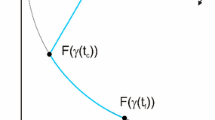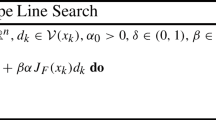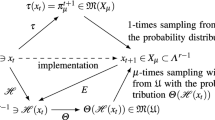Abstract
The paper introduces a multi-deme, memetic global optimization strategy Hierarchic memetic Strategy (HMS) especially well-suited to the solution of a class of parametric inverse problems. This strategy develops dynamically a tree of dependent populations (demes) searching with the various accuracy growing from the root to the leaves. The search accuracy is associated with the accuracy of solving direct problems by \(hp\)–adaptive Finite Element Method. Throughout the paper we describe details of exploited accuracy adaptation and computational cost reduction mechanisms, an agent-based architecture of the proposed system, a sample implementation and preliminary benchmark results.
The work presented in this paper has been partially supported by Polish National Science Center grants no. DEC-2012/07/B/ST6/01229 and DEC-2011/03/B/ST6/01393.
Access this chapter
Tax calculation will be finalised at checkout
Purchases are for personal use only
Preview
Unable to display preview. Download preview PDF.
Similar content being viewed by others
References
Tarantola, A.: Inverse Problem Theory. Mathematics and its Applications. Society for Industrial and Applied Mathematics (2005)
Engl, H., Hanke, M., Neubauer, A.: Regularization of Inverse Problems. Mathematics and its Applications, vol. 375. Springer, Heidelberg (1996)
Pardalos, P., Romeijn, H.: Handbook of Global Optimization (Nonconvex Optimization and its Applications), vol. 2. Kluwer (1995)
Chakraborty, U.K. (ed.): Advances in Differential Evolution, vol. 143. Studies in Computational Intelligence. Springer (2008)
Cantú Paz, E.: Efficient and accurate parallel genetic algorithms, vol. 2. Kluwer (2000)
Törn, A.A.: A search clustering approach to global optimization. In: Dixon, L.C.W., Szegö, G.P. (eds.) Towards Global Optimisation 2, pp. 49–62. North-Holland, Amsterdam (1978)
Schaefer, R., Adamska, K., Telega, H.: Genetic clustering in continuous landscape exploration. Engineering Applications of Artificial Intelligence 17, 407–416 (2004)
Schaefer, R., Kołodziej, J.: Genetic search reinforced by the population hierarchy. In: Foundations of Genetic Algorithms 7, pp. 383–399, Morgan Kaufman (2003)
Wierzba, B., Semczuk, A., Kołodziej, J., Schaefer, R.: Hierarchical Genetic Strategy with real number encoding. In: Proceedings of the 6th Conference on Evolutionary Algorithms and Global Optimization, pp. 231–237 (2003)
Barabasz, B., Migórski, S., Schaefer, R., Paszyński, M.: Multi-deme, twin adaptive strategy hp-HGS. Inverse Problems in Science and Engineering 19(1), 3–16 (2011)
Demkowicz, L., Kurtz, J., Pardo, D., Paszyński, M., Rachowicz, W., Zdunek, A.: Computing with hp Finite Elements II. Frontiers: Three-Dimensional Elliptic and Maxwell Problems with Applications. Chapman & Hall/CRC (2007)
Neri, F., Cotta, C., Moscato, P. (eds.): Handbook of Memetic Algorithms. Studies in Computational Intelligence, vol. 379. Springer, Heidelberg (2012)
Cetnarowicz, K., Kisiel-Dorohinicki, M., Nawarecki, E.: The application of evolution process in multi-agent world (MAW) to the prediction system. In: Tokoro, M. (ed.) Proceedings of the 2nd International Conference on Multiagent Systems (ICMAS 1996). AAAI Press (1996)
Byrski, A., Schaefer, R., Smołka, M., Cotta, C.: Asymptotic guarantee of success for multi-agent memetic systems. Bulletin of the Polish Academy of Sciences: Technical Sciences 61(1), 257–278 (2013)
Jojczyk, P., Schaefer, R.: Global impact balancing in the hierarchic genetic search. Computing and Informatics 28(2), 181–193 (2009)
Wróbel, K., Torba, P., Paszyński, M., Byrski, A.: Evolutionary multi-agent computing in inverse problems. Computer Science 14(3), 367–383 (2013)
Burczyński, T., Orantek, P.: The hybrid genetic-gradient algorithm. In: Proceedings of 3rd KAEGiOG Conference, Potok Złoty, Poland (1999)
Grochowski, M., Smołka, M., Schaefer, R.: Architectural principles and scheduling strategies for computing agent systems. Fundamenta Informaticae 71(1), 15–26 (2006)
Bellifemine, F.L., Caire, G., Greenwood, D.: Developing Multi-Agent Systems with JADE. Wiley (2007)
Author information
Authors and Affiliations
Corresponding author
Editor information
Editors and Affiliations
Rights and permissions
Copyright information
© 2014 Springer-Verlag Berlin Heidelberg
About this paper
Cite this paper
Smołka, M., Schaefer, R. (2014). A Memetic Framework for Solving Difficult Inverse Problems. In: Esparcia-Alcázar, A., Mora, A. (eds) Applications of Evolutionary Computation. EvoApplications 2014. Lecture Notes in Computer Science(), vol 8602. Springer, Berlin, Heidelberg. https://doi.org/10.1007/978-3-662-45523-4_12
Download citation
DOI: https://doi.org/10.1007/978-3-662-45523-4_12
Published:
Publisher Name: Springer, Berlin, Heidelberg
Print ISBN: 978-3-662-45522-7
Online ISBN: 978-3-662-45523-4
eBook Packages: Computer ScienceComputer Science (R0)




